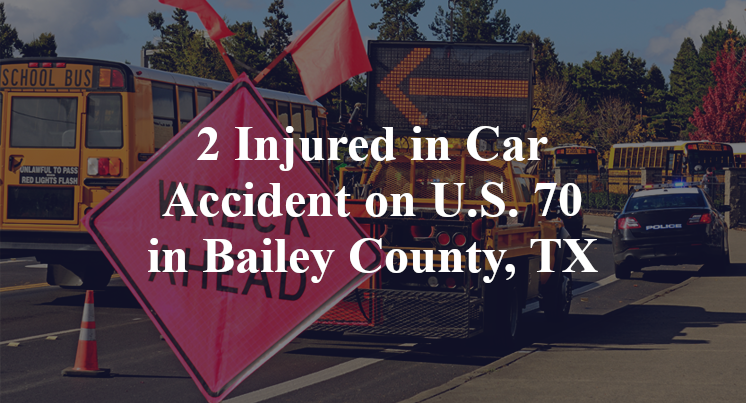2 Injured in Car Accident on U.S. 70 in Bailey County, TX
Muleshoe, TX — April 27, 2025, two people were injured due to a car accident shortly after 5:45 p.m. along U.S. Highway 70.
According to authorities, three people—a 38-year-old man from Earth, Texas, a 23-year-old man, and a 25-year-old man—were traveling in an eastbound Toyota Tacoma pickup truck on U.S. 70 in the vicinity of F.M. 3269 when the accident took place.

Officials indicate that, for reasons yet to be confirmed, the Tacoma failed to safely pass an eastbound Chevrolet Silverado on the left. A collision reportedly took place between the front-left quarter of the Silverado and the front-right of the Tacoma. The Tacoma also apparently overturned over the course of the accident.
The 23-year-old passenger from the Tacoma sustained serious injuries due to the wreck, according to reports; the 38-year-old driver received minor injuries, as well. Additional details pertaining to this incident—including the identities of the victims—are not available at this point in time. The investigation is currently ongoing.
Commentary by Attorney Michael Grossman
When crashes like this happen—especially during attempted passing maneuvers on rural highways—there’s often a rush to assume the driver misjudged the gap or acted too aggressively. But in my experience, serious injuries resulting from this kind of incident call for a more thorough investigation. The collision and rollover involving a Toyota Tacoma and a Chevrolet Silverado on U.S. Highway 70 near Muleshoe highlights the need to dig deeper. Three essential questions must be asked.
First, did investigators carefully evaluate the roadway layout and conditions where the passing maneuver was attempted? Highways like U.S. 70 often have sections where passing is allowed, but the visibility, road width, or elevation may make such actions risky—even if they appear legal on paper. Was the road marked with passing zones? Was there limited visibility due to curves, elevation changes, or traffic? These are critical details to determine whether the maneuver was appropriate or unexpectedly hazardous.
Second, has anyone looked into whether a mechanical issue in either vehicle contributed to the crash? For example, a delayed acceleration or steering issue in the Tacoma could have interfered with the passing effort, while a braking or signal malfunction in the Silverado could have played a role in the vehicles coming into contact. Mechanical failures aren’t always immediately visible and require a forensic examination of both vehicles involved, ideally before they’re moved or altered.
Finally, has all relevant electronic and digital evidence been collected and analyzed? Both trucks likely contain event data recorders that can reveal essential information such as vehicle speed, braking input, steering activity, and throttle response in the seconds leading up to the crash. This data can help determine how the vehicles were positioned and whether the drivers took action to avoid the collision. Investigators should also consider GPS records, dashcam footage, and any surveillance video that may offer a clearer picture of the incident.
Answering these three questions is critical to making sure that no stone is left unturned in understanding the causes of a crash like this. Serious wrecks deserve serious investigation, not assumptions. Getting clear answers to these questions is crucial for those seeking to understand what happened and why—and it's the least that can be done to help those affected find the clarity and closure they deserve.

*We appreciate your feedback and welcome anyone to comment on our blog entries, however all visitor blog comments must be approved by the site moderator prior to showing live on the site. By submitting a blog comment you acknowledge that your post may appear live on the site for any visitors to see, pending moderator approval. The operators of this site are not responsible for the accuracy or content of the comments made by site visitors. By submitting a comment, blog post, or email to this site you acknowledge that you may receive a response with regard to your questions or concerns. If you contact Grossman Law Offices using this online form, your message will not create an attorney-client relationship and will not necessarily be treated as privileged or confidential! You should not send sensitive or confidential information via the Internet. Since the Internet is not necessarily a secure environment, it is not possible to ensure that your message sent via the Internet might be kept secure and confidential. When you fill out a contact or comment form, send us an email directly, initiate a chat session or call us, you acknowledge we may use your contact information to communicate with you in the future for marketing purposes, but such marketing will always be done in an ethical way.